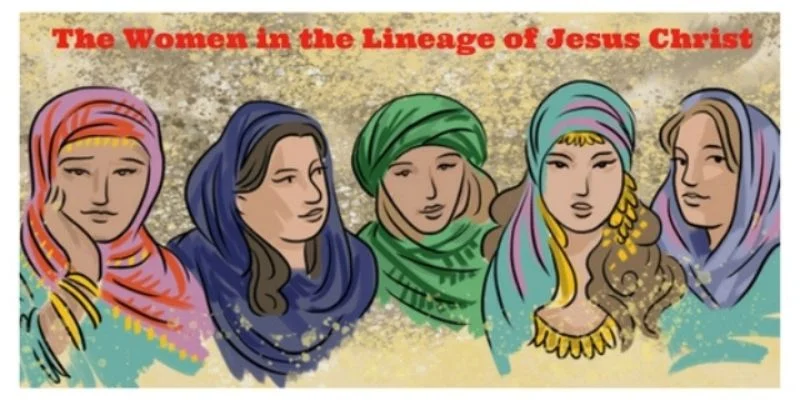
The New Testament was written in a time when genealogies rarely included women. This makes Matthew’s inclusion of five women in Jesus Christ’s genealogy (Matthew 1:1-17) particularly striking, especially since some of them had controversial pasts.
What prompted Matthew to highlight these women? Who were they, and what does their presence signify?
By including them, Matthew breaks from tradition, emphasizing that Jesus came for all people, regardless of gender, background, or personal history.
Tamar: The Determined Widow
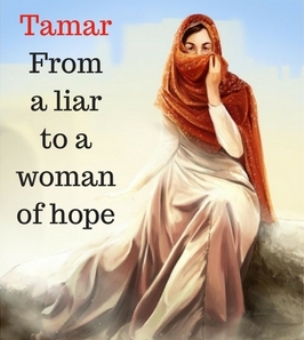
Tamar is the first woman named in Matthew 1:3 as the mother of Judah’s twins, Perez and Zerah. Her story, found in Genesis 38, tells of a woman who faced great injustice. After her husband, Er, died due to his wickedness, Tamar was left childless.
According to Jewish tradition, Judah, her father-in-law, was responsible for ensuring she bore children through one of his surviving sons. However, his son Onan refused, and God struck him down as well. Fearing further loss, Judah withheld his youngest son, Shelah, from Tamar.
Realizing that Judah had no intention of keeping his word, Tamar took matters into her own hands. Disguising herself as a prostitute, she tricked Judah into fathering her children.
Despite the deception, Tamar’s actions ensured the continuation of the Messianic lineage. Perez, one of her twin sons, became an ancestor of Jesus, fulfilling the prophecy that the Messiah would come from the tribe of Judah (Genesis 49:10).
Tamar’s Transformation
Often criticized for her deception, Tamar was actually the victim of a broken system. Judah and his sons failed in their obligations, and Tamar resorted to unconventional means to uphold family lineage.
Her story is not just one of survival but of perseverance and hope—a testament to how God can work through unexpected circumstances. It also speaks to the importance of justice in biblical law, highlighting that Tamar was ultimately vindicated (Genesis 38:26).
Rahab: The Redeemed Harlot
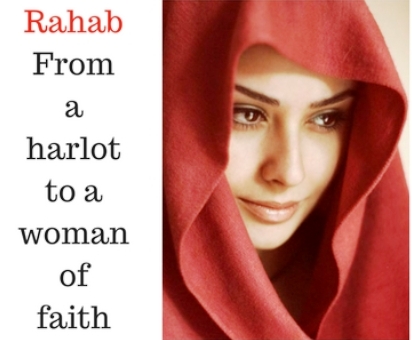
Rahab, the wife of Salmon, is the second woman mentioned in Jesus’ lineage (Matthew 1:5). Unlike Tamar, who pretended to be a harlot, Rahab was one. Her story in Joshua 2 and Joshua 6:22-24 reveals her remarkable transformation.
When Joshua sent spies to Jericho, Rahab sheltered them from their pursuers. She had heard of God’s mighty works and declared, “The Lord your God is God in heaven above and on the earth below” (Joshua 2:11).
Because of her faith, the spies promised to spare her and her family. She later married Salmon and became the mother of Boaz, who would marry Ruth.
Rahab’s Transformation
Rahab’s faith turned her from an outcast into a hero of Israel. She actively placed her trust in God, tying a scarlet cord in her window as a sign of her belief in His promise (Joshua 2:21). Her faith earned her a place in the “Faith Hall of Fame” (Hebrews 11:31) and on equal footing with Abraham in James 2:21-25. Her story showcases God’s power to redeem and elevate those who seek Him.
Rahab’s story is also significant because she was a Canaanite, a people traditionally considered enemies of Israel. Yet, her inclusion in Jesus’ lineage illustrates God’s plan to extend salvation beyond Israel to all nations.
Ruth: The Devoted Outsider
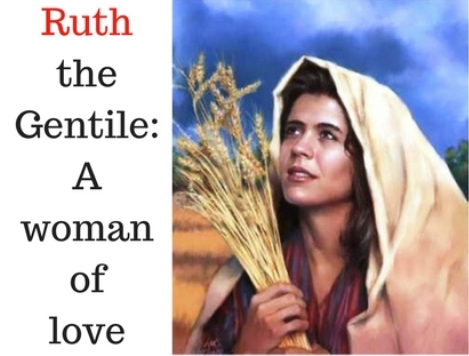
Ruth, a Moabite widow, became Rahab’s daughter-in-law (Matthew 1:5). Her story is recorded in the Book of Ruth. After losing her husband, Ruth chose to remain with her Israelite mother-in-law, Naomi, rather than return to her own people. Her famous declaration of loyalty, often quoted in weddings, reads:
“Where you go I will go, and where you stay I will stay. Your people will be my people and your God my God” (Ruth 1:16).
Her devotion led her to Boaz, a relative of Naomi, whom she married. Ruth became the great-grandmother of King David, further solidifying her place in the Messianic lineage.
Ruth’s Transformation
Ruth’s story is one of faithfulness and reward. Despite being a foreigner, she embraced the God of Israel and was abundantly blessed. Her life foreshadows Jesus, our ultimate Redeemer.
The Book of Ruth also emphasizes God’s providence, showing that even while suffering, He orchestrates events for good.
Bathsheba: The Victimized Queen
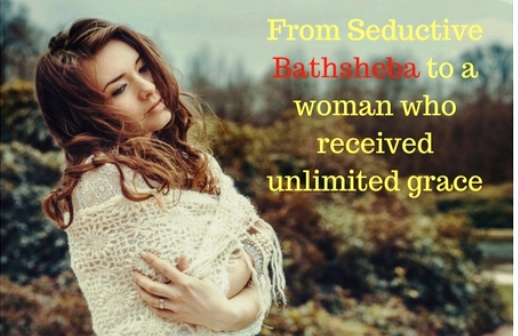
Bathsheba is not named directly in Matthew’s genealogy but is referred to as “the wife of Uriah” (Matthew 1:6). This reference highlights the scandal surrounding her relationship with King David (2 Samuel 11-12).
Often blamed for seducing David, Bathsheba was actually performing a ritual purification when the king saw her. David, fully aware that she was married, sent for her and slept with her. Some scholars suggest Bathsheba had little choice, as rejecting the king could have been dangerous.
When she became pregnant, David arranged for her husband, Uriah, to be killed in battle. Though their first child died as a consequence of David’s sin, Bathsheba later became the mother of Solomon, Israel’s wisest king.
Bathsheba’s Transformation
Though her story began in tragedy, Bathsheba experienced God’s grace. She became an influential queen and mother to the future king, Solomon. Her inclusion in Jesus’ lineage speaks to God’s ability to bring beauty from brokenness.
Furthermore, in 1 Kings 1, she played a vital role in securing Solomon’s throne, showing her wisdom and resilience.
Mary: The Obedient Servant
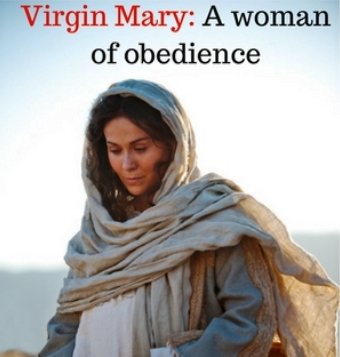
The final woman in Jesus’ genealogy is His mother, Mary (Matthew 1:16).
Unlike the others, Mary was likely the only Jewish woman among them. A young virgin engaged to Joseph, Mary faced great risk when she conceived by the Holy Spirit. In Jewish culture, an engaged woman found to be pregnant could face public disgrace or even execution.
Joseph, a righteous man, initially planned to divorce her quietly but was reassured by an angel that Mary’s child was conceived by God (Matthew 1:18-21). Mary’s obedience and trust in God’s plan allowed her to become the mother of the Messiah.
Mary’s Obedience
Mary’s faith echoes Isaiah’s prophecy: “The virgin will conceive and give birth to a son, and will call him Emmanuel” (Isaiah 7:14). Despite the challenges, she embraced her role, declaring, “I am the Lord’s servant” (Luke 1:38). Her story underscores the importance of submission to God’s will.
Conclusion
The inclusion of women in Jesus’ genealogy challenges cultural norms and highlights God’s grace.
In a society that often overlooked women, these five broke through barriers with their faith, courage, and perseverance. Their stories remind us that God values and uses all people, regardless of their past.
These women—Tamar, Rahab, Ruth, Bathsheba, and Mary—demonstrate that God can transform brokenness into beauty. Their lives encourage us to trust in His power to redeem and restore, proving that no one is beyond His reach.
Their inclusion also reflects God’s greater plan to bring salvation to all people, not just Israel, reinforcing the message of grace that Jesus would later preach.
Affiliate Disclaimer
This post contains affiliate links. If you click on one of the links and make a purchase, I may receive a small commission at no extra cost to you. I only recommend products I truly believe in and think will be beneficial to my readers. Thank you for supporting Biblical Christianity!
Recommended Resource:
 |
The Confident Woman Devotional: 365 Daily Inspirations, Revised and Updated By Joyce Meyer / FaithWords Do you get caught up in worrying about the future instead of living in the present? Do issues of confidence, self-image, and relationships trouble you? You aren’t alone! Through powerful daily devotions, Meyer guides you toward a vibrant life filled with love, laughter, and God’s acceptance. Includes a new introduction and inspirational quotes. 423 pages, hardcover from Faithwords. |

I’m pretty new to exploring the Bible, and to be honest, it can sometimes feel a bit overwhelming. But this article really caught my attention. I never really thought about the women in Jesus’ family line before, most of the time, they’re just not talked about much in the stuff I’ve seen.
But the way you highlighted their stories really made me think. What really stood out is how these women weren’t perfect or always making the best choices, but they were still part of something bigger. That actually gave me hope because it’s easy to feel like you need to have everything figured out.
But reading this reminded me that it’s about grace, not perfection, and that’s comforting when you’re just starting to understand all this.
Thanks for making this all feel approachable and real. It helped me see a new perspective 🙂
Hi Matteo,
Thank you so much for taking the time to share this—it really means a lot. I’m so glad the article spoke to you in that way.
You’re absolutely right—these women weren’t perfect, and yet, God still chose to weave them into the beautiful story of redemption. That’s a powerful reminder for all of us, especially when we feel unsure or unqualified.
I completely understand how overwhelming the Bible can feel when you’re just starting out, but I want to encourage you: you’re already doing something wonderful by leaning in and being open to learning.
God’s Word has a way of revealing more and more over time, and you’re not alone in the journey. We’re all learning and growing in grace.
Thank you again for your kind words—they truly encouraged me too. Keep exploring, keep asking questions, and know that God’s grace meets us right where we are. ?
Blessings,
Alice
Loved reading this history of the women in Jesus’s lineage. It is great to see that very few of them were perfect and they all made their own fair share of mistakes for which they were forgiven.
I just wondered if there are gaps in this lineage or is this the exact order directly above Jesus?
Hi Michel,
Thank you so much for your thoughtful comment! I’m really glad you enjoyed the article and found encouragement in the stories of these women.
It truly is amazing how God chose to include women from all walks of life—flawed, foreign, and faithful—in the lineage of our Savior. It shows us His grace and how He redeems even the most broken parts of our stories for His divine purposes.
Regarding your question about the lineage—yes, that’s an insightful observation! The genealogies recorded in Matthew 1 and Luke 3 both trace Jesus’ ancestry, but they do it differently, and scholars believe there are some gaps.
Matthew’s account is more stylized and selective. He groups the genealogy into three sets of fourteen generations (Matthew 1:17), which suggests that he may have intentionally omitted certain names to create a memorable structure.
This was a common literary practice in Jewish genealogies at the time and doesn’t undermine the accuracy—it was just a different way of recording history for theological emphasis. Matthew’s goal was to highlight Jesus as the promised Messiah, the Son of David and Abraham.
Luke’s genealogy, on the other hand, traces all the way back to Adam and is believed by many scholars to be through Mary’s line (while Matthew traces Joseph’s). This would mean that Luke’s account presents Jesus’ biological lineage, while Matthew presents His legal or royal lineage.
So to answer your question—yes, there are likely some intentional gaps in the recorded genealogies, especially in Matthew’s account. But both serve the purpose of affirming Jesus’ rightful place in both the Jewish heritage and God’s redemptive plan.
Thanks again for reading and engaging with the content! If you have more questions, I’d love to keep the conversation going.
Grace and peace,
Alice ✨
I made a mistake, I tried messaging not on here, but I figured you’ll check it before it goes up, I read it wrong about not getting recognition from Ruth.
Hi Naomi,
Thank you for taking the time to re-read the article, especially the part about Ruth and Naomi (your namesake) and then clarifying what you’ve said in your first comment. I truly appreciate it.
I did have a chance to review them before approving and I hope you don’t mind that I decided to let them appear here as they are.
Blessings!
Where in the Bible does it say Naomi didn’t reward Ruth for her loyalty? I think she held her baby. Also Naomi is in the lineage of Jesus Christ as well, in the Bible it says, there is a son born to Naomi, and they called him Obed. Family is family, you don’t say an adopted child isn’t family because the mum and dad didn’t birth him/her.
You’re absolutely right Naomi, adopted or not, they’re still considered family.
Interesting view on the women in the lineage of Jesus Christ. I find the story of Bathsheba truly sad, being torn away from her husband, who then later is killed, only because a king wants his wife. You go on to say that from this story we could learn that God can transform situations and bring about newness and hope. I am a bit at a loss here as I find that difficult to understand. Do you transform situations by having apparently innocent people killed?
Hey Jerry, thanks for your comment.
The story of Bathsheba is really sad and more so because most Bible readers perceive her to be a seducer; that it was her fault King David (who was walking uprightly with God) got tempted and committed adultery with her. But like I said, the fault was not on her but on the king.
You asked: How can God transform situations by having apparently innocent people killed? First of all, based on God’s standards, no one is innocent. The Bible clearly says, “No one is righteous, not even one” “for all have sinned and fall short of the glory of God” (Romans 3:10, 23). Secondly, the sin of adultery and murder committed by King David may not have been God’s perfect will, but He ALLOWED it in order to carry out His greater purpose.
The story of Joseph the Dreamer is another account wherein God allowed Joseph to be sold by his own brothers to an Egyptian and had their father Jacob believed that he lost his favorite son. God allowed this to happen in order to get Joseph to Egypt ahead of time before the great famine to save many lives (Genesis 50:19-20).
And if we continue to read the story, David suffered the consequences of his sin which tells us that God does not condone sin, not even of those people closest to His heart.
So yes, God can transform situations to bring about newness and hope.
God bless you!
Wow, I love your site. I especially love TAMAR.
I have to go re-read about her because I did not see her as a woman of lies before she turned into a woman of hope. I was just thinking about the Mystery Woman of Babylon and how I get women of today that are seeking, “worldly liberation,” to understand the dangers of worldly influences and to remain firmly grounded upon God’s word to lead the men of this generation.
I have always felt women outside of Christianity have not had many role models and that is why they are so easily led into corrupt thinking and how could I show them a biblical representation of a good woman.
Thank you so much for your site. Keep up the good work.
I’ve always thought the women in the lineage of Christ are interesting. They may have come from different backgrounds or belief system and had their own flaws. Yet God chose each of them specifically to be part of the Son’s human ancestry.
Tamar may have lied by making Judah believe she was a prostitute in order to keep her ties with her dead husband’s family. But God had a better and bigger plan for allowing all these things to happen, which is to produce the son that would become the ancestor of Christ.
Thanks for stopping by, God bless!
You’ve done an excellent job of telling the stories of these remarkable women. I have done some research in regards to Rahab. Some understanding of the culture she came from helps to clarify her situation.
As slavery was a common thing at that time, she may well have started out a sex slave. They were also worshipers of Molech, which meant they practiced child sacrifice. It’s not hard to imagine that Rehab, trapped into prostitution though no fault of her own, saw the Jews as a ticket out of the loathsome profession she was trapped in. A chance to start over. Who knows how many of her children were offered up to Molech? What heartache she may have endured?
This is a story of salvation, rebirth and freedom.
Hi Sheila, thanks for sharing this info about Rahab.
Considering that she was a Canaanite, Rahab may have practiced child sacrifice to Molech. (The Bible tells us that child sacrifice is just one of the greatest sins of the Canaanites that prompted God to totally wipe them out.)
But regardless whether Rahab actually was a worshiper of Molech and has practiced child sacrifice or not, her story depicts the tremendous grace of God that can save even the vilest sinner and offender.
Rahab’s story is indeed a story of salvation, rebirth and freedom which is found only in Jesus Christ.
Hi Alice!
Thank you for sharing this article. It is very interesting to know the story and character of those people in the bible. There names are very meaningful and inspirational.
When I was pregnant in a baby girl, I searched what name I can give to her that is connected to my faith because I want to thank God for His blessing.
This article will be helpful not only searching names but also to learn from their lives.
God bless you more and may you serve as an inspiration as follower of our Lord
Thanks again for visiting my site, I appreciate your comment.
While most people may not want to use the names of these biblical women I mentioned for their kids, I think it’s a great idea to consider naming our daughters after them. After all, these women are in the lineage of Jesus Christ. It would be a great honor to be named after them.
If we really look into the characters of these women, we will be surprised how God transformed them from their old self to a new character that is pleasing and honorable to God. Their life stories are proofs of God’s grace, love and mercy which we the believers are enjoying today.
God bless you!
Hi Alice. first of all I want to say thank you. Thank you for creating this website, I love it, I am a Christian and in the faith of Baptist, and I love reading this type of literature so I have book marked this site for future reference. I will learn from it at some point of my readings. And it’s because of people like yourself that keeps us going.
May God bless you in every way asked.
Hello Denney!
Thank you so very much for your kind words. To read such encouraging words from fellow believers is always a joy and a blessing. I am honored and blessed to be able to share my passion on the Word through my website and I hope to reach more people through this platform.
Keep running the race of faith to the end, Shalom and God bless!
Love this article after I read it. I remember story of some women in The Bible. Now I learned them more.
I remember that redeemed by the blood of Jesus Christ. He redeems us from this same fate. Just like Ruth, Boaz, the children of God are now part of the lineage of Christ, as His children. The Bible said that. I like character “Ruth” because of her story and helped my heart grow up and pray to The Lord.
Thank you for the lovely information and reminding me of that.
Prayer
James
James,
Although most people seem to think of women as inferior to men, I believe that women hold a very special place in the very heart of God and in His plans. Like in the cases of Tamar, Rahab, Ruth, Bathsheba and Mary who were used by God to bring us the Messiah, women these days are also being used by God mightily to carry out His works on earth before He comes again for the second time.
Among these five women, I also love Ruth the most because I see myself in her. I’m a sinner saved by grace by no other than Jesus, my Redeemer. To see the characters of these women as presented to us by the Scriptures and not just by our own is an encouragement that God really can transform every single one of us into the person and character that He wants us to be.
Alice,
Oh my goodness!
It totally excites me to read this article. It shows us a virtuous women (Psalm 31)among each description. I would like to read a bit more and see who I identify myself with. For example, at least three characteristics from different females.
Same with men; I’d like to read an article just like this one where I can say “I want my husband to be a Boaz, a Moses, etc. with each positive characteristic all combined as a whole.
Hi Linda, thanks for stopping by.
A lot of people consider most of these women, with the exception of Mary and perhaps Ruth, as having a negative impact on the personhood of Jesus the Messiah because of their somewhat “spotty” reputations. So for these women to be included in the lineage of Jesus Christ is something that is quite puzzling.
But if we really look into what their presence actually imply, we will be amazed to discover how these women have been transformed by the grace of God from their old character to a new woman that is pleasing to God.
I love every one of these biblical characters but my favorite remains to be Ruth because her story is a picture of the church and Jesus Christ. The church which is predominantly gentile is the bride of Christ, the kinsman Redeemer. Boaz to Ruth is Jesus Christ to us, the Church.
I love this article. You treatment of these women is great. It seems that all to often the women of the Bible are either ignored or belittled and you have certainly done neither.
Makes me want to find out more about these women and also others that are in the Bible but maybe not in the direct line of Jesus.
Thank you for this informative and educational article, I am sure many others will find it the same. God Bless.
Hi Frank, thanks for your comment.
I always believed that God has high regard for women, although many scholars seem to think otherwise. I agree with you that often times the women in the Bible are ignored and thought of as insignificant but if we are to look closely at the context of each passage where women are mentioned, we realize that they play important roles in the plan of God for mankind.
There are other women in the Bible who are not in the lineage of Jesus Christ who have shown to have remarkable characters such as Miriam the sister of Moses, Deborah (the only female judge), Esther and many more.